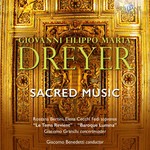
Dreyer: Sacred Music
 $25.00
Out of Stock
$25.00
Out of Stock6+ weeks add to cart
GIOVANNI FILIPPO DREYER
Dreyer: Sacred Music
Rossana Bertini (soprano), Elena Cecchi Fedi (soprano), Le Tems Revient"|"Baroque Lumina, Giacomo Bededetti (conductor), Giacomo Granchi
[ Brilliant Classics / CD ]
Release Date: Friday 1 April 2022
This item is currently out of stock. It may take 6 or more weeks to obtain from when you place your order as this is a specialist product.
World premiere recordings of psalms and hymns by a forgotten luminary of the Florentine Baroque.
Giovanni Filippo Dreyer (1703-1772) was born in Florence, Italy. As a castrato soprano he sang in several productions in Rome in 1723, including Vivaldi's Ercole sul Termodonte, then in Lucca and Florence in Sarri's Didone abbandonata. For the carnival of 1725-26, Dreyer sang Albinoni's operas in Venice. In 1726 he moved to Wroclaw, Poland, where he stayed for a long time. It was not until 1739 that he continued on to Prague to perform on the stage of Count von Sporck. During this period his compositions were publicly presented, including the intermezzo Vespetta e Valesio of 1728. In Prague he then took part in Vivaldi's Agrippa. In 1731 Dreyer accepted an invitation to Moscow: the imperial court generously rewarded his musical services. In 1733-34 Dreyer moved, following the imperial court, to St Petersburg, and if his activities as a castrato remain unknown, he certainly took on the role of impresario, coming to Florence to hire musicians for Russia, passing through Dresden and Vienna. Upon his return to Florence he took up holy orders, and from that moment dedicated himself to composing sacred music.
In 1740 Dreyer composed an anthology of Salmi Brevi à 4 voci con Strumenti (Short Psalms for four voices with Instruments) whose autograph manuscript is conserved at Santissima Annunziata. The musical style of the eleven psalms (composed for vespers) is close to that of the Neapolitan school, with a distinction between the vocal part and the orchestral accompaniment. The harmonic writing is broad, clear and expressive, such as to be appreciated by the general public and not only by a small circle of specialists.
This beautiful new production is sung by sopranos Rossana Bertini and Elena Cecchi Fedi, the choir Le Tems Revient and the instrumental ensemble Baroque Luminis, conducted by Giacomo Benedetti. whereas Widor's influence is clear in the use of the organ and the classical forms.
Tracks:
Verbum Caro a due Soprani
Soprano 1 & 2, cello, violone and organ
1. Adagio 2'03
2. Allegro moderato 1'33
Domine ad adjuvandum a 4 con Gloria a Canto Solo
3. Largo Choir, cello, violone and organ 1'17
4. Affettuoso Soprano 1, cello, violone and organ 2'05
5. (Sicut erat) Choir, cello, violone and organ 0'19
6. Allegro Choir, cello, violone and organ 1'38
Inno a 4 voci per San Filippo
7. (O Dive) Alto, choir, violins,
viola, cello, violone and organ 2'19
8. Andante Soprano 2, violins,
viola, cello, violone and organ 2'14
9. Allegro Choir, violins, viola,
cello, violone and organ 0'41
10. (Beata Trinitas) Alto, choir, violins, viola, cello, violone and organ 2'29
Salmi Brevi à 4 voci con Strumenti (1740)
Choir, violins, viola, cello, violone and organ
11. Domine 1'21
12. Dixit 3'30
13. Confitebor 4'00
14. Beatus 4'08
15. Laudate pueri 3'47
16. Laetaus sum 4'00
17. Nisi Dominus 3'56
18. Lauda Jerusalem 4'39
19. Laudate Dominum 1'45
20. Credidi 4'35
21. Magnificat
organ and harpsichord 5'11
First Recordings
Rossana Bertini soprano 1 · Elena Cecchi Fedi soprano 2
"Le Tems Revient" · "Baroque Lumina"
Giacomo Granchi concertmaster and primary source researcher
Giacomo Benedetti conductor